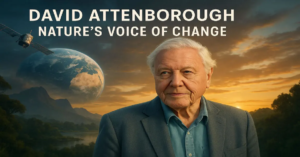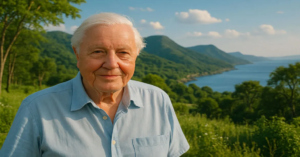David Attenborough: The Voice of Nature | Legacy, Documentaries & Climate Impact
The Man Who Whispers to the World
David Attenborough and the Art of Paying Attention

Rain hammers the tin roof of a Borneo longhouse. 1976.
Young David Attenborough sits cross-legged on rattan mats, sweat soaking his collar. An Iban tribesman passes him fermented rice wine in a coconut shell. Outside, gibbons sing the forest awake.
“They say the hornbill carries messages between worlds,” the elder murmurs, tracing bird wings in the firelight.
David leans closer. Not as a scientist. Not as a broadcaster.
As a storyteller hungry for truth.
This is who he is:
A 97-year-old man who still gasps when a damselfly lands on his notebook.
Who cries watching archival footage of glaciers he once stood upon.
Who whispers “astonishing” over a worm’s iridescent skin.
David Attenborough in the Limestone Cathedral (Leicester, 1937)
Young David’s sanctuary wasn’t his bedroom – it was a quarry.
The smell: Wet stone and crushed ferns.
The treasure: Trilobites fossilized in slate like pressed flowers.
“Split the rock,” his father taught, “and time collapses.”
One rainy Tuesday, 11-year-old David pried open a slab. Inside: the coiled shell of an ammonite – unseen for 150 million years.
He pressed his palm against its spiral.
Cold. Ancient. Alive.
At dinner, brother Richard (future actor) reenacted Shakespeare. David slid the fossil onto the tablecloth:
“This creature swam when dinosaurs were hatchlings.”
His mother sighed, “Must it live next to the gravy boat?”
The Accidental Broadcaster (BBC Studios, 1952)
Teeth. That’s why radio rejected him.
“Your sibilants whistle,” they said. “And your incisors… distract.”
Television hired him as a “trainee producer” – a role requiring zero on-camera presence.
Then: The Freddie Incident.
1953. Live broadcast. A chimpanzee named Freddie:
– Ate the chrysanthemum decorations
– Bit the director’s ankle
– Escaped into the makeup room
Panic. Static. Then… David’s voice, calm as Sunday breakfast:
“Well… Freddie seems to prefer Revlon’s ‘Cherries in the Snow’ lipstick. Can’t say I blame him.”
The switchboard lit up. “Who WAS that man?”
When Grief Became His Compass (London, 1997)
Jane’s cancer was swift. Forty-seven years of marriage ended in a hospice room smelling of lilies and antiseptic.
For months, David wandered Kew Gardens at dawn. “I’d watch spiders mend webs,” he told a friend. “Life insisting on itself.”
Then came the birds-of-paradise project. In New Guinea, he filmed a male Sicklebill – obsidian feathers catching the sun like oil slicks.
“Jane,” he breathed into his field notes.
Later, he confessed: “I needed her to see that iridescence. So I named it for her.”
The Attenborough Method: Slow Magic
1. The 90-Second Rule
The Blue Planet, 2001. A sperm whale carcass sinks through twilight.
No music. No narration. Just bubbles rising from bone.
“Hold it,” David insisted as producers fidgeted. “Let them feel the descent.”
Viewer mail: “I wept for a whale I never knew existed.”
2. The “Sideways Glance”
Madagascar, 2008. Crew filming lemurs.
David’s head swivels. “Look! The chameleon!”
A lizard’s tongue snaps a moth mid-air.
Director: “But David, we’re on lemurs–”
“THIS is the story,” he whispers. “Precision. Hunger. Grace.”
3. The Hummingbird Epiphany
His 90th birthday present to himself? High-speed cameras.
“Watch!” He grabs your sleeve like an excited boy. “Their wings draw infinity symbols in the air. Infinity!”
Kitchen Table Wisdom (David Attenborough Home, Richmond, 2023)

Morning ritual:
1. Feeds robins (“Robert” and “Roberta”)
2. Drinks Assam tea from a chipped “World’s Greatest Grandpa” mug
3. Reads Journal of Myrmecology (ant studies)
His confession:
“I talk to earthworms while gardening. Apologize when moving them.”
On modern nature films:
“Too much *dun-dun-DUN!* music. As if a wren building a nest is a car chase.”
The Day He Changed His Mind (Galápagos, 2005)
For decades, he avoided activism. “Not the BBC’s role.”
Then he met Lonesome George – last Pinta Island tortoise.
The creature’s eyes held millennia of solitude.
“Like staring into a dying galaxy,” David murmured.
That night, he wrote in his journal:
“We broke the world.
Now we must mend it.”
His next film: Climate Change – The Facts. Unflinching. Urgent.
Colleagues worried: “You’ll lose audiences.”
He gained 500 million viewers.
Small Moments That Moved Mountains
The Plastic Straw Revolt
After Blue Planet II showed albatrosses feeding plastic to chicks:
– A 9-year-old girl confronted her MP: “Sir David says stop!”
– Starbucks banned plastic straws within 18 months.
The Letter to Maya
2019. A child’s crayon drawing: orangutans crying over chopped trees.
His reply:
“Dearest Maya,
Tell your class this: When you breathe in, thank a tree.
When you drink, thank a cloud.
You belong to them as they belong to you.
– David”
Maya’s current project: 12,000 kids planting Indonesian rainforest.
Vulnerabilities: The Unedited Takes
- Imposter Syndrome: “I never studied biology! Just… looked.”
- Guilt: “My early films showed ‘untouched’ wilderness. But we’d already broken it.”
- Fear: “Will wonder be enough to save us?”
His coping mechanism? Naming things.
– A three-legged fox in his garden: “Hopkins”
– A star-nosed mole in Planet Earth II: “Sir Digby”
“If you name them,” he says, “you can’t ignore their fate.”
At 97: Still Curious
Glastonbury Festival, 2023
He crowd-surfed (in a wheelchair). Got a temporary tattoo: † for extinct species.
“Best mosh pit ever!” he beamed.
Papua New Guinea, 2024
Filming tree kangaroos. Heatstroke hit. Crew begged him to rest.
“Nonsense!” He sipped water, adjusted his hat. “That joey hasn’t learned to jump yet. I want to see her try.”
Why We Still Listen
“He doesn’t perform awe,” says director Sara Ford. “He is awe.”
His secret? Treating viewers as co-discoverers, not students.
– When he whispers “Shh… watch this,” 500 million hearts still.
– When he murmurs “We have a problem,” schools change curricula.
“We’re not saving ‘the planet,’” he insists. “We’re saving our home. Our only shot at wonder.”
David Attenborough Last Frame: The Garden Bench
Richmond, twilight.
David watches a thrush crack a snail on a stone.
“Clever girl,” he murmurs.
A neighbour calls over the fence: “Everything alright, Sir David?”
He smiles. “Everything’s astonishing.”
Above him, Venus pulses in a lavender sky.
The camera holds.
The thrush sings.
The world breathes.
“People protect what they love.
They love what they understand.
They understand what they’re taught to see.”
– Attenborough’s Unwritten Law
Leave a Reply
Want to join the discussion?Feel free to contribute!